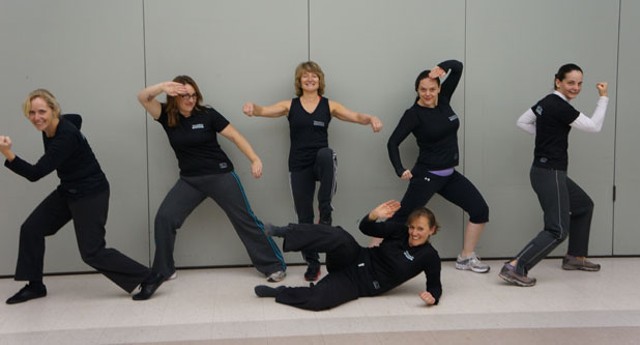Published January 15, 2014 at 6:15 a.m.
Beware, Burlington bogeymen, burglars, sexual predators and any other jerks who attack women: You do not want to meet Christine DiBlasio in a back alley. A third-degree black belt in kempo jujitsu karate and a licensed psychologist, she will take you down physically, mentally and verbally — whatever she has to do to keep herself safe.
And she’s not alone. Meet Darcy Richardson-Miller, forensic toxicologist and second-degree black belt; Nancy Keller, educator and second-degree black belt; Karen Chevalier, police officer and second-degree black belt; Hillary Boucher, forensic chemist and first-degree black belt; and Christina Allard, physical therapist and third-degree brown belt. Known as the Safety Team, the six women have made it their mission to empower other women with the self-defense tactics used to avoid, fend off and diffuse common attacks.
After several years of teaching women’s self-defense workshops, the Safety Team formed a nonprofit that aims to reach towns, corporations, colleges and community organizations. Its programs range from two-hour introductory classes to eight-hour intense workshops to private sessions.
“The goal isn’t to hurt someone else,” says DiBlasio. “The goal is to escape with as minimal injury to yourself as possible, so that you can live another day and be with your family.”
It was DiBlasio’s family, in fact, that triggered her interest in martial arts nearly 15 years ago. Her daughters, then 5 and 7, were starting classes at the Martial Way Self-Defense Center in Colchester; when she began taking classes herself, DiBlasio found herself hooked on the mind-body benefits. Martial arts made her focus: “I couldn’t think about anything else, or it would not end well for me, so it got me to be mindful of what I was doing,” she says. “And I gradually became more fit; I stopped bumping into tables so much — my coordination improved.”
Back then, DiBlasio was often one of only two women in the class; the other was Richardson-Miller. “Growing up, my brothers had done martial arts, and I’d seen the Karate Kid movies, and I wanted to be able to defend myself,” Richardson-Miller recalls. “You have this confidence that goes with you when you’ve taken martial arts.”
When the two women decided to train other women in self-defense, they already had a guru in Martial Way’s Dave Quinlan, a sixth-degree black belt who started the Think Safe for Women program in the 1990s. Think Safe is based on martial-arts skills along with research from law-enforcement officers and interviews with survivors — and sometimes perpetrators — of violence.
As a “sister” organization, the Safety Team collaborates on curriculum with Think Safe in Colchester but works as a nonprofit; the women frequently travel to different sites to offer workshops. “A unique aspect of our program is that it’s by women, for women,” says DiBlasio. “Female participants can identify with the instructors, who have likely shared their safety concerns, both for themselves and for other women — daughters, friends, family members — that they care about.”
Participants start by expressing those concerns on paper, in a pre-class questionnaire that also asks them which activities they engage in that might make them inadvertently vulnerable to a potential attack. “Really, the physical skills are kind of the last resort,” Richardson-Miller says. “The easiest thing and the most effective thing is just staying out of the situation in the first place.”
So part of the Safety Team’s work is educating women on how to remove the risk from their routines — parking in a different location, for example, locking the front door, or leaving a late-night shift with a coworker instead of alone. “Realizing that there were parts of my life that made me vulnerable helped [me] to personalize the rest of the course,” says Jackie Lynch, a 35-year-old teacher in Essex who has taken several Safety Team courses. “It hit home that I could be a potential victim and made me want to ensure I did everything in my power to prevent something from happening.”
Stephanie Robinson, 44, of Essex has also taken several Safety Team classes and reports that she now feels more in control, armed with better ways to protect herself — beginning with heightened awareness. Says Robinson, “I don’t take chances [anyway], but maybe even less now.”
Richardson-Miller’s work as a forensic toxicologist helps her communicate the risks of alcohol. It’s the No. 1 date-rape drug, she says, and one of the reasons why college students, especially in their first semesters when they haven’t yet built trustworthy relationships, are at highest risk for sexual assault.
Another key component of Safety Team classes is learning how to carry oneself confidently, make eye contact and get verbal with a loud “no” when necessary. That can be one of the most challenging aspects of the program, instructors say. “Women don’t want to offend,” says DiBlasio. “Well, it’s better to be rude than dead.”
When it does come to physical skills, the Safety Team teaches basic strikes designed to be easy to remember under the influence of an adrenaline-inducing attack. “There’s fight, flight or freeze, and if you don’t practice ‘fight,’ you’re very likely to freeze,” explains DiBlasio. Her work as a psychologist with survivors of sexual violence spurred her to found the Safety Team, she notes, and continues to inform how she and other members help women enhance their personal safety.
“You don’t have to use these strikes and kick the guy’s butt to next Tuesday,” says police officer Chevalier. “Just enough to get away.”
What about weapons? Chevalier advises participants — and all women — to familiarize themselves with pepper spray and similar deterrents if they plan to carry them. Otherwise, they provide a false sense of safety. She also counsels women on refusing to go to a second location with a predator. “If he has a gun on you and tells you to get in a car, he’s going to take you someplace where he has more control,” she says. “Do what you have to do to avoid that.”
Sexual violence, guns and kidnapping are serious topics for a two-hour session, but members of the Safety Team work on creating a warm and comfortable environment, bringing cookies for the class’ debriefing component and cracking occasional jokes.
“The workshop was a lot of fun,” says Saramichelle Stultz, 46, of the December class she took in Essex Junction. She went because she felt nervous about home break-ins, she says, and about her daughter attending college soon. “Those ladies added many laughs by their camaraderie and good sense of humor.”
Humor can offset not only the unsettling statistics about attacks against women, but also the ick factor of some of the strikes — such as using both thumbs to gouge out an attacker’s eye. “It’s gross to think of,” says Safety Team participant and professional legal assistant Darci Benoit, 33, of Swanton, “but it was funny while being taught.”
Ideally, the session ends with women feeling empowered, and members of the Safety Team say they’ve seen surges in self-worth, even after only two hours. “You’re super energized,” says Stultz. “You walk away feeling like you’ve got some solid tools to keep yourself safe.”
Nancy Keller, also on the Safety Team, says a Somalian high schooler whom she mentored last year told her, “I grew up where it was either kill or be killed.” After four to five months of martial-arts training, the student was transformed by her confidence. “There’s an impact on mental skills associated with self-defense and self-protection,” Keller explains. “There’s a synergy there that’s really powerful.”
As DiBlasio explains, seeing that small women — or big women, or older women — can fight back has a profound effect. While the Safety Team instructors have “reached the highest levels of achievement in the male-dominated world of martial arts,” says Quinlan, they possess even more vital skills. “Their compassion, skill and dedication are evident to all who participate in their classes,” he continues. “They handle the unpleasant reality of dealing with violence in an inspiring, engaging and empowering way.”
The original print version of this article was headlined "Kicking Back"
More By This Author
Speaking of...
-

'We Must Act Now': Burlington Council Passes Resolution on Drug Crisis, Public Safety
Oct 11, 2023 -

Three Vermont Schools Will Win a $100,000 Fitness Center
Mar 9, 2023 -

Plunging Into Post-Pandemic Exercise With Aerial Dance
Jun 2, 2021 -

Video: Alison Bechdel Shares 'The Secret to Superhuman Strength'
May 6, 2021 -

Video: The Tran Family Patriarch Gets Vaccinated
Mar 11, 2021 - More »
Comments
Comments are closed.
From 2014-2020, Seven Days allowed readers to comment on all stories posted on our website. While we've appreciated the suggestions and insights, right now Seven Days is prioritizing our core mission — producing high-quality, responsible local journalism — over moderating online debates between readers.
To criticize, correct or praise our reporting, please send us a letter to the editor or send us a tip. We’ll check it out and report the results.
Online comments may return when we have better tech tools for managing them. Thanks for reading.















































